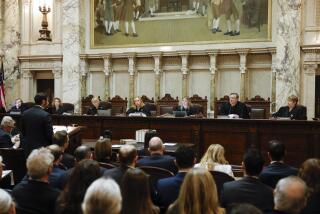Judge Criticizes Proposal to Break Up Federal Appeals Court
- Share via
The chief judge of the U.S. 9th Circuit Court of Appeals on Monday said it would be a “grave mistake” for Congress to split the circuit into three operating divisions, as recommended by a blue ribbon commission last year.
Circuit Judge Procter Hug Jr., of Reno, Nev., said in a Los Angeles speech that the plan, if adopted by Congress, would have an adverse impact on the administration of justice--particularly in California.
Under the proposal by a commission chaired by former Supreme Court Justice Byron White, the northern and eastern districts of California--based in San Francisco and Sacramento--would be placed in a division with Hawaii, Nevada, Guam and the Northern Mariana Islands. The central and southern districts of California--based in Los Angeles and San Diego--would be put in another division with Arizona, while a third division would encompass five northwest states--Alaska, Washington, Oregon, Idaho and Montana.
Each of the divisions would operate in a semiautonomous fashion and decisions made in each division would not be binding on the others. Hug said this aspect of the plan is its “major defect. . . . The prime stated objective of the commission to have consistent circuit law is seriously abrogated by this divisional approach.”
It is a particularly bad idea to split California, Hug said, because it could lead to different precedents on the same issue in two parts of the state.
The chief judge acknowledged that the plan calls for a separate super division of 13 judges, whose sole role would be to reconcile direct conflicts that arise among the other three divisions. But he said that would just add another level of appeal.
Both California senators have criticized the plan, as has the U.S. Justice Department and the chief judges of eight of the 12 other federal circuits. In addition, Hug said 25 of 35 active and senior judges on the 9th Circuit said at a recent judges meeting that the plan is unwise, even though one of their colleagues, Judge Pamela A. Rymer of Pasadena, served on the commission and supports the split.
Among the plan’s major advocates are senators from the northwest states who say the circuit--the nation’s biggest--is much too large to function well. Those individuals also have been strongly critical of 9th Circuit decisions on environmental, endangered species, civil rights and death penalty cases.
A bill to enact the commission report has been introduced by Republican Sens. Frank Murkowski of Alaska and Slade Gorton of Washington. The bill is expected to pass the Senate, perhaps this summer, but the measure faces trouble in the House, according to congressional and judicial sources. Among the leading opponents is Charles Wiggins, a 9th Circuit judge based in Reno, who was appointed by President Ronald Reagan in 1984 and earlier served as a Republican congressman from California.
“I don’t think [the Murkowski bill] will ever be enacted into law in its present form,” said Wiggins, who calls the measure politically motivated and judicially unwise.
In other remarks at a federal Bar Assn. lunch, Hug lamented that the Senate Judiciary Committee, chaired by Sen. Orrin Hatch (R-Utah), has declined to hold any confirmation hearings for federal judgeships this year.
More to Read
Get the L.A. Times Politics newsletter
Deeply reported insights into legislation, politics and policy from Sacramento, Washington and beyond. In your inbox twice per week.
You may occasionally receive promotional content from the Los Angeles Times.










